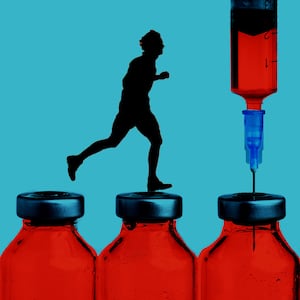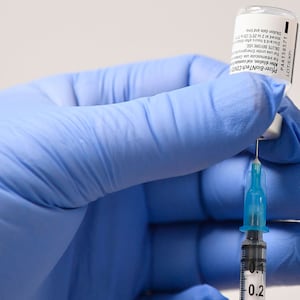Like many Americans, Madonna Laws-Lowell has mixed feelings about the COVID-19 vaccine rollout.
Hope. Anger. Despair. Confusion.
The difference: Laws-Lowell, 53, has only one functioning lung and is still in the monitoring stage after she underwent surgery, and then chemotherapy, for colorectal cancer in 2019.
“My lungs could not withstand COVID,” she told The Daily Beast.
An orchid enthusiast based in St. Louis, Missouri, Laws-Lowell is finding the uncertainty surrounding when she might get vaccinated to be almost as unbearable as the pandemic itself.
And she finds the pandemic extremely unbearable.
“My husband and I, we go to the grocery store every two weeks, and it’s like storming the beach at Normandy,” Laws-Lowell told The Daily Beast, adding, “I haven’t had a haircut since March. We haven’t had so much as a french fry from a restaurant since April. You only have one opportunity to be wrong.”
Laws-Lowell has a master’s degree in financial modeling but has not worked since 2002, after her fifth spontaneous lung collapse from what turned out to be a birth defect. She’s missing what she described as a “chunk” in her left lung, and after surgery and multiple collapses, the scarring in both lungs has caused significant damage.
But like many Americans who are at high risk of severe COVID-19 and under the age of 65, Laws-Lowell is not currently eligible for a vaccine. For these citizens, the hope that defined the earliest stage of the vaccine rollout has given way to something else: outrage.
“None of my doctors across two different hospital systems can tell me when or where I’d be able to get a vaccine,” Laws-Lowell told The Daily Beast on Thursday. “My local Walgreens has a recording on the line that tells the callers they have no idea when the vaccine will be available, there is no waiting list and no appointments are available.”
The Centers for Disease Control and Prevention’s priority list for the vaccine, which it recommends states follow, puts Laws-Lowell in Phase 1C. In Phase 1C’s second bracket are “people aged 16—64 years with underlying medical conditions which increase the risk of serious, life-threatening complications from COVID-19,” according to the agency’s website.
It is frustrating and confusing, she said, to know that her marathon-running, 65-year-old neighbor, whom she compared to “the Energizer bunny,” might be eligible when people like her are not.
“I would never suggest that you shouldn’t give her a vaccine, but how did simply being over 65 become more important?” she asked.
“I do not get how simply being 65 puts you ahead of my friend Chuck with one leg and no immune system.”

In fact, Missouri’s tier system should put anyone aged 65 and older at the same priority level of adults with cancer, chronic kidney disease, chronic obstructive pulmonary disease, and a slew of other conditions. That may place Laws-Lowell within eligibility as early as next Monday, according to The Missouri Independent, after state health officials activated that tier earlier than planned.
The Missouri State Health Department did not respond to a request for comment.
Before Thursday, vaccinations in the state were limited exclusively to frontline health-care workers or residents and staff of long-term care and nursing facilities, according to the newspaper. As of Thursday, 528,300 doses were distributed in Missouri, and 175,314 residents had received a first dose, data from the Centers for Disease Control and Prevention showed.
Even amid steady progress, months of rogue activity from anti-maskers, and those who refuse to be vaccinated—coupled with the frustrating rules behind the rollout—has left many Americans feeling like they’re viewed as expendable.
In fact, as stories of vaccine line-skippers make the rounds and some states cancel appointments because they’re out of doses, those with pre-existing conditions can’t help but feel like they’ve been completely written off.
“The whole thing has exposed a level of just selfishness and meanness that I just didn’t want to know,” said Laws-Lowell.
Of course, many of the high-risk and chronically ill Americans who spoke to The Daily Beast on Thursday say that’s nothing new, as they spend a lifetime fighting for visibility and demanding to be taken seriously.
Rod Mourant, a 46-year-old accountant and widower with chronic lymphocytic leukemia—an incurable but treatable form of the disease—said he feels that it’s strange to be in such a low priority group. But he’s actually worried less about his own survival and more about what his death might mean, he told The Daily Beast.
“I can’t stress enough that I don’t live in fear of getting sick myself,” said Mourant, who has two teens in Fruitland, Idaho. “I’m afraid of having a bad outcome that would orphan my children.”
When news of the Pfizer and Moderna vaccines’ effectiveness broke, Mourant said he got his hopes up. He has come crashing back down.
“Idaho has published, and revised, its rollout plan, placing those under 65 who are at greater risk near the end of the line,” said Mourant. “Under the current guidelines, I shouldn’t expect to receive the first dose of any vaccine until March or April, which is frustrating and disheartening.”
A spokesperson for the Idaho Department of Health and Welfare told The Daily Beast, “Unfortunately, we don’t have enough vaccine to vaccinate everyone at once. People who have the highest risk of infection or exposure because they can’t work from home, or are in certain age groups, are being prioritized.”
Some people have even less information.
Ben Ranfeld, a 39-year-old husband, father, and university employee who lives in Albany, Indiana, is on oxygen 24/7 due to a combination of severe asthma, chronic hypoxic respiratory failure, and several other respiratory conditions, he said.
“I have only left my house six times since February 2020,” Ranfeld told The Daily Beast. Five of those excursions were for doctor appointments, he said.
“I was relieved and excited when talk of the vaccine being a reality [occurred] in November,” said Ranfeld. “I've been in close contact with my lung doctors, and they were assuring me I would be first in line after health-care workers because of my high-risk.”
But now? Ranfeld said his doctors have “no information” about when he could become eligible, which “feels like a punch in the gut.”
A spokesperson for the Indiana State Department of Health told The Daily Beast, “We are taking an age-based approach to current expansion because age is the number one cause of hospitalizations and death due to COVID. Additional groups will be added based on vaccine availability.”
Even for the eligible, it’s a nightmare. Many in the groups currently allowed to sign up for the vaccine cannot get appointments and must instead use connections to health-care workers to get a first shot.
As Dr. Ira Kodner—an emeritus professor of surgery at Washington University Medical School—put it, that disorganization is itself a more pressing problem than the guidelines and priority lists themselves.
When even federal guidelines are followed to varying degrees by each state as they choose, when there isn’t as much vaccine in each state as they planned to have, when each distributor is getting fewer doses than they thought they would, when individual pharmacies and clinics are making their own decisions, there’s chaos.
“And where there’s chaos, there’s no ethics,” said Kodner. “No one is specifically being discriminated against because everyone is being discriminated against because there is no centralized plan for distribution.”
Even for those eligible for doses, said Kodner, “Right now, it’s essentially first-come, first-serve based on who can manipulate their way through the internet and social media, and there’s nothing ethical about that.”
“If it’s left to every individual, or every individual distributor, then it can’t be ethical,” he added. “It’s not fair or ethical for physicians to have to make a social worth evaluation for any given patient.”
Optimally, this would mean the amount of care and attention to detail that goes into, say, the organ transplant system, would go into decision-making surrounding the vaccine. On that score, Kodner said he is confident that the Biden administration—which has already solicited guidance from the world’s leading experts in medical ethics—will quickly establish a robust and ethical set of guidelines and then ensure they are followed more consistently.
Combined with more doses and more vaccine providers, Kodner said he believes “next week will be a different world.”
But that may not be enough without the right communication to the general public.
As Laws-Lowell said, “If I could tell my elected officials anything, it would be, ‘We all want to get the vaccine, you just need to tell us how.’”









